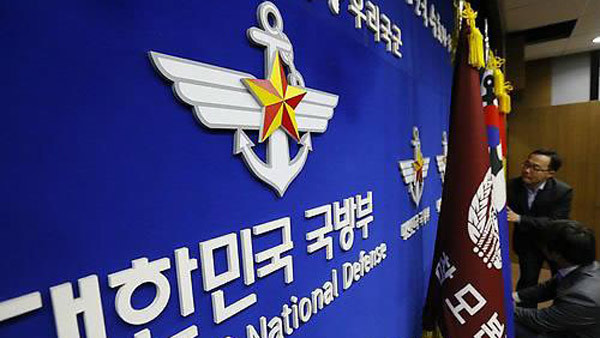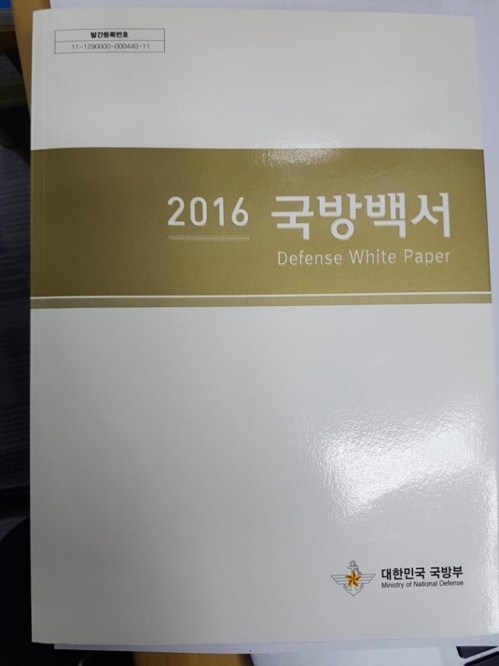Seoul seeks to stop referencing NK as ‘main enemy’ in defense paper
By Yeo Jun-sukPublished : Aug. 22, 2018 - 09:25
With the South Korean government accelerating its efforts to reduce tension and build trust with North Korea, the military is seeking to stop referencing North Korea as its official enemy in a defense paper to be published this year.
Citing unidentified multiple government sources, Yonhap News Agency reported Wednesday that the 2018 defense white paper would no longer describe North Korea as a main enemy in a bid to fulfill its pledge to stop hostile acts against North Korea.
The Ministry of National Defense instead would adopt less hostile expressions to describe North Korea’s military threat in the biannually published white paper, the sources said. The previous 2016 defense white paper said “as long as North Korea’s military threat persist, its regime and army is enemy.”
“It doesn’t make sense for us to hold consultations (with the North) over measures to halt hostile acts while leaving the description of the North Korean military as an enemy in our government’s official paper,“ an unnamed source was quoted as saying by Yonhap.

When asked about the report, the Defense Ministry said it will give “serious consideration” to the removal of North Korea as a main enemy before the government publishes the 2018 defense white paper in December.
The debate over whether to describe North Korea as a main enemy has been a recurring theme in South Korea’s rancorous politics. Depending upon political ideology and inter-Korean relations, previous administrations have taken differing stances.
The first time that North Korea was referenced in the white paper as a main enemy was 1995, a year after the North Korean delegate threatened to turn Seoul into a “sea of flames” during inter-Korean talks.
The description has come under scrutiny since the Kim Dae-jung administration pursued rapprochement with North Korea. In 2004, the phrase of “main enemy” was replaced with “direct military threat” by the Roh Moo-hyun administration, which followed in Kim’s engagement policy.
But the expression was brought back in 2010 when North Korea was found to blame for torpedoing South Korean warship Cheonan. Since then, the white papers have said the North Korean regime and army constitute an enemy as long as its military threat persists.
“For us, the North Korean military is a unique presence. On one hand, it is the enemy to fight against. On the other hand, it is the counterpart for dialogue. We have to deal with such subtle nature,” said a retired Air Force general, requesting anonymity due to the sensitivity of the issue.

The measure came with a series of conciliatory steps taken by South Korea to build trust with North Korea on the military front. President Moon Jae-in and North Korean leader Kim Jong-un agreed to cease “all types of hostile acts” during their summit on April 27.
As a trust-building measure, Defense Minister Song Young-moo has announced a plan to pull back guard posts along the border with North Korea. The withdrawal is expected to begin with 10 guard posts positioned about 1 kilometer within the Military Demarcation Line.
US Forces Korea Commander Gen. Vincent Brooks said while there is a military risk involved with reducing military presence in heavily fortified region, the danger is tolerable enough to proceed with trust-building measures.
“I have some concerns about what that means militarily for the ability to defend along the Military Demarcation Line,” Brooks said during a press conference Wednesday. “I believe there is a reasonable degree of risks involved in this, not an excessive amount of risk.”
By Yeo Jun-suk (jasonyeo@heraldcorp.com)







![[KH Explains] Hyundai's full hybrid edge to pay off amid slow transition to pure EVs](http://res.heraldm.com/phpwas/restmb_idxmake.php?idx=644&simg=/content/image/2024/04/18/20240418050645_0.jpg&u=20240419100350)






![[From the Scene] Monks, Buddhists hail return of remains of Buddhas](http://res.heraldm.com/phpwas/restmb_idxmake.php?idx=652&simg=/content/image/2024/04/19/20240419050617_0.jpg&u=20240419175937)

![[KH Explains] Hyundai's full hybrid edge to pay off amid slow transition to pure EVs](http://res.heraldm.com/phpwas/restmb_idxmake.php?idx=652&simg=/content/image/2024/04/18/20240418050645_0.jpg&u=20240419100350)

![[Today’s K-pop] Illit drops debut single remix](http://res.heraldm.com/phpwas/restmb_idxmake.php?idx=642&simg=/content/image/2024/04/19/20240419050612_0.jpg&u=)